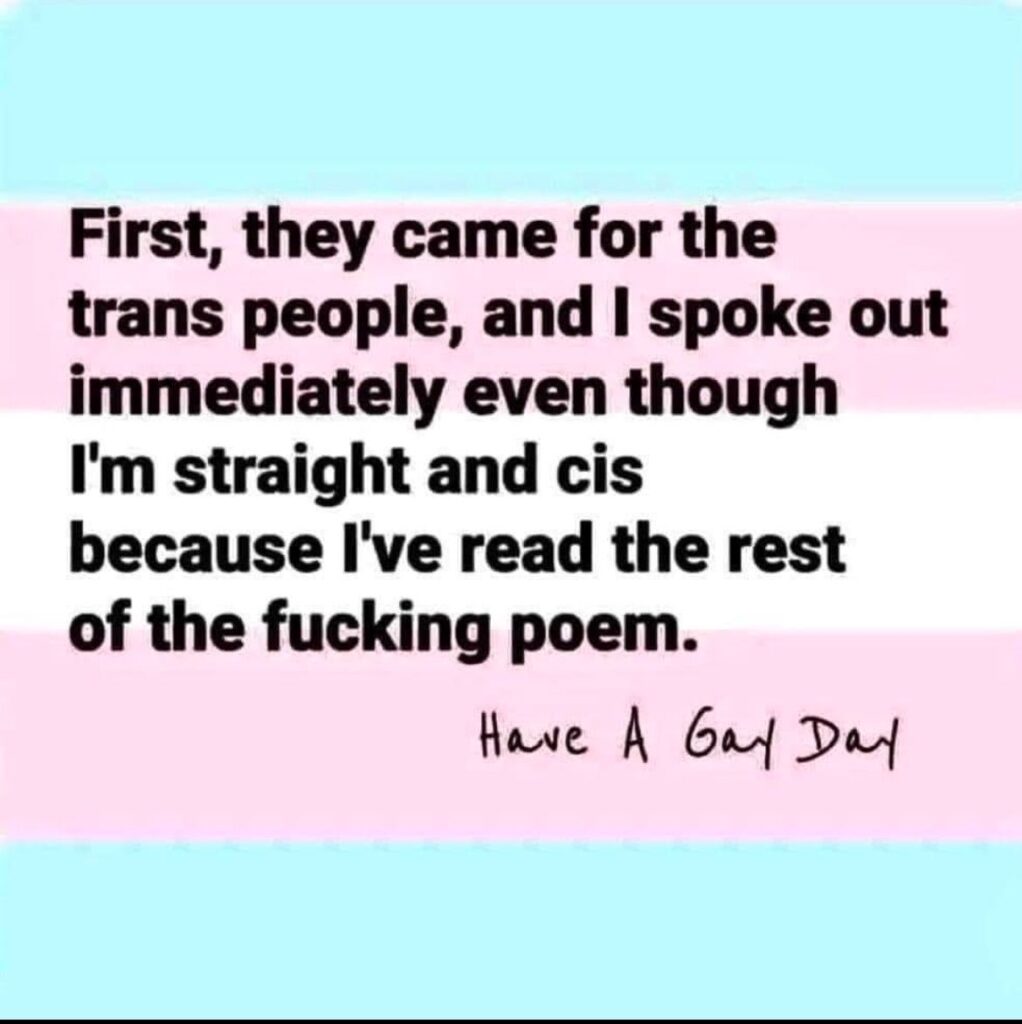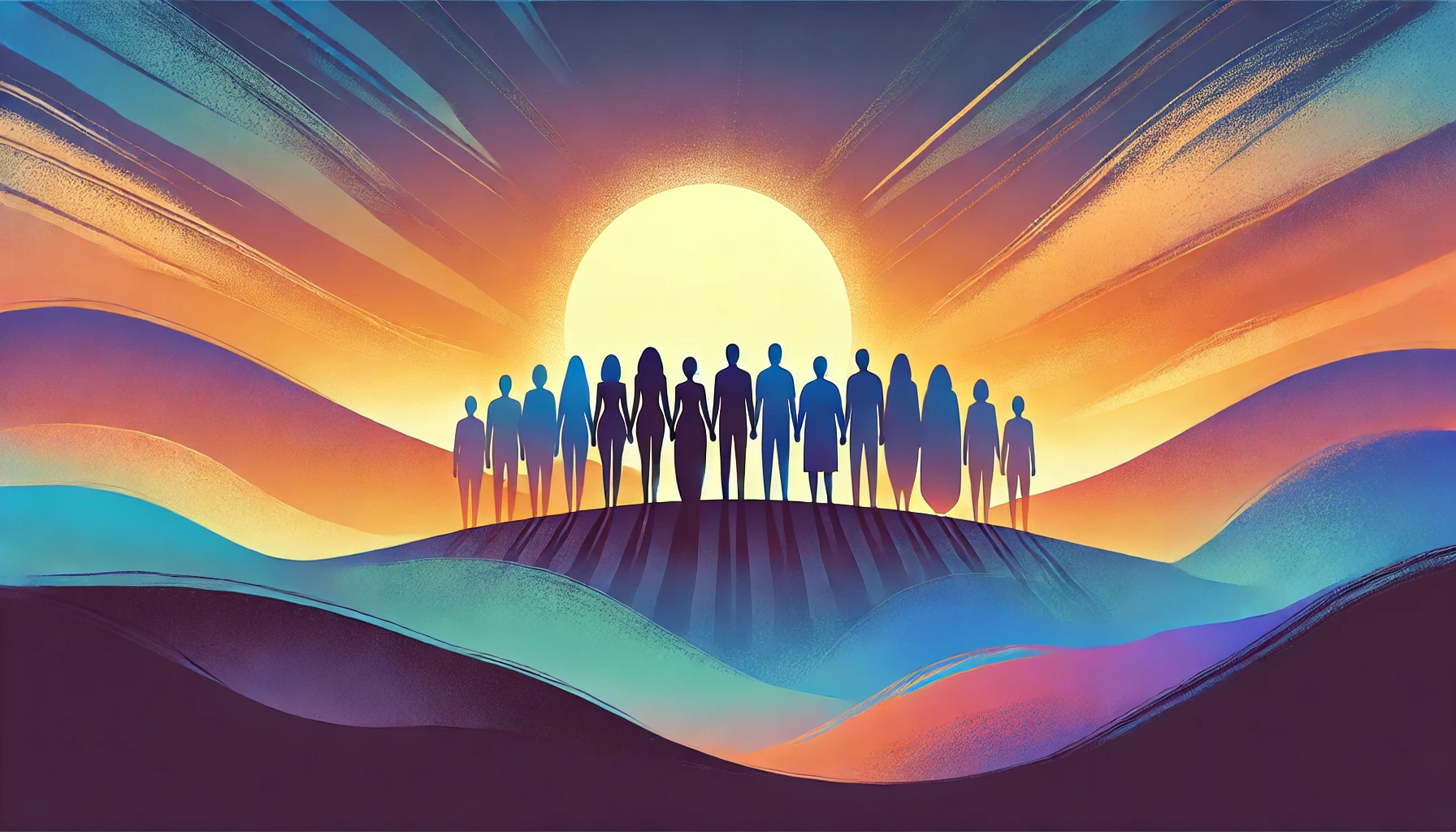Empathy isn’t merely a nice-to-have quality—it’s the glue that holds together civil society.
The ability to recognize and resonate with others’ experiences and struggles is fundamental to any society that values justice and equality. Marcus J. Carey’s article, “Hammers and Nails vs. Nails and Hammers,” resonates deeply with this sentiment, illustrating that we often see problems through the narrow lens of our own tools or experiences. However, civil society requires that we broaden our perspective, especially toward issues that may not directly impact us. It’s easy to ignore struggles that don’t affect us personally, but in doing so, we risk building a world where injustice flourishes unchallenged.
This principle has never been more relevant. Across the United States, fundamental rights for women, LGBTQ+ individuals, and other marginalized groups are under threat. The reversal of Roe v. Wade, the passage of discriminatory legislation targeting transgender individuals, and the rollback of other hard-won protections are reminders of how swiftly societal progress can be undone.
I won’t claim to be completely unaffected, but I am very aware of my own privilege in that most of the adverse effects won’t directly apply to me. I am a hardcore atheist and will adamantly fight for separation of church and state—but as a straight cis white male military veteran who was raised Protestant and officially converted to Judaism along the way, I can blend in and pass as MAGA-identifying as long as I don’t reveal that I have actually read the Bible, respect the Constitution, and recognize that science outweighs opinions. So, mostly I will be fine.
But, it’s not about me. For those of us not directly impacted, empathy compels us to speak up and stand alongside those who are. As the famous poem “First They Came…” by Pastor Martin Niemöller reminds us, silence in the face of others’ suffering only ensures that we will be left alone when it is our turn.

Empathy in Action: Understanding Why It Matters
Empathy is more than a feeling—it’s a social responsibility. When we cultivate empathy, we break down the barriers between “us” and “them.” This isn’t just philosophical; research has shown that diverse support strengthens advocacy efforts and builds resilient communities. When people unaffected by an issue join the fight, it amplifies the voices of those who are directly impacted. It signals a shared humanity and strengthens the movement for change.
For example, reproductive rights advocacy has drawn support from unexpected allies, including male-dominated groups who understand that restricted rights impact families, communities, and society at large. Similarly, cisgender individuals are increasingly standing in solidarity with the LGBTQ+ community, recognizing that attacks on gender expression and identity affect the societal fabric as a whole. These acts of solidarity don’t just help those directly impacted; they also encourage others to listen, empathize, and take action.
Current Challenges: The Erosion of Rights and Marginalization
Today, several marginalized communities face existential threats to their rights. Here’s a closer look at the struggles that demand empathy and support from all of us:
- Women’s Reproductive Rights: The reversal of Roe v. Wade has left many women, especially those from low-income and marginalized communities, with restricted or nonexistent access to essential healthcare. This rollback signifies a troubling trend toward governmental control over personal autonomy, which should prompt empathy from those unaffected. Recognizing that erosion of rights for one group could pave the way for further limitations for all is critical in preserving freedom and equality.
- LGBTQ+ Protections: Legislation targeting LGBTQ+ rights, particularly those of transgender individuals, has increased, limiting access to gender-affirming healthcare, participation in sports, and discussions of LGBTQ+ topics in schools. These laws foster a climate of fear and exclusion, undermining the inclusivity crucial to a healthy civil society. Empathy here means supporting the dignity and freedoms of all individuals, regardless of identity.
- Racial and Ethnic Minorities: Black, Indigenous, and people of color (BIPOC) communities face historical and ongoing racial discrimination across education, employment, healthcare, and the justice system. This persistent inequality limits opportunities and entrenches social and economic divides. Empathy here involves actively opposing systemic discrimination and fostering equal access for all racial and ethnic groups.
- Religious Minorities: Many religious minorities, including Muslims, Sikhs, and Jews, face hate crimes, discrimination, and legal challenges that impact their ability to practice their faith freely. In a diverse society, empathy toward religious minorities involves safeguarding freedom of religion and promoting tolerance and understanding.
- People with Disabilities: Those with physical, cognitive, and mental disabilities often face a lack of accessibility, limited accommodations, and societal stigma that hinder their ability to live independently and with dignity. Empathy for people with disabilities means advocating for inclusive policies and ensuring equitable access to resources and opportunities.
- Immigrants and Refugees: Immigrants and refugees, particularly those without legal documentation, face discrimination, exploitation, and limited access to essential services like healthcare, housing, and education. Language barriers and cultural differences often add to social exclusion. Empathy here includes supporting fair immigration policies and working toward a more inclusive environment.
- Low-Income and Homeless Individuals: Poverty often leads to systemic exclusion from education, healthcare, and housing, while homelessness carries additional health risks and social stigma. Low-income individuals face constant financial stress, limiting their chances to break the cycle of poverty. Supporting programs that address basic needs and economic opportunities is an empathetic approach to addressing this issue.
- Neurodivergent Individuals: Neurodivergent individuals, including those with autism, ADHD, and other neurological conditions, face challenges due to societal misunderstanding, limited accommodations, and discrimination. Many encounter barriers in education, employment, and public spaces that are not designed for diverse neurological needs. Empathy involves promoting understanding and creating inclusive environments that accommodate neurodiversity.
- Women of Color and Intersectional Identities: Women of color experience compounded discrimination based on race, gender, and economic background, impacting their healthcare, employment, and representation in society. Empathy for individuals with intersectional identities involves recognizing these layered challenges and advocating for policies that address inequality on multiple fronts.
The Role of the “Unaffected”: Why Empathy is Needed From All of Us
When we look at injustice through the narrow lens of our own experiences, we risk becoming passive bystanders. As Marcus J. Carey points out in “Hammers and Nails vs. Nails and Hammers,” it’s vital to approach issues with the understanding that solutions—and the perspectives that drive them—must be adaptable. We are all in this together, and empathy requires those of us with power or privilege to amplify the voices of those less heard.
When unaffected people lend their support, it validates and strengthens marginalized communities’ calls for justice. Silence, on the other hand, enables oppressive systems to thrive. Pastor Niemöller’s poem serves as a timeless reminder of this truth: when we allow the rights of others to be taken without objection, we’re setting a dangerous precedent that could eventually affect us all. The lack of empathy becomes the silent tool of oppression.
Empathy as a Skill: How to Cultivate and Demonstrate Empathy in Daily Life
Empathy isn’t an automatic response—it’s a skill we can cultivate. Here’s how you can make empathy part of your daily life and help support marginalized communities:
- Listen and Learn: Start by engaging with the stories of those who are different from you. Read books (ESPECIALLY any book that others are attempting to ban), watch documentaries, and follow people from marginalized communities on social media to better understand their experiences.
- Speak Out: Taking a public stance may be uncomfortable, but that discomfort pales in comparison to the challenges faced by those under attack. Empathy involves actively supporting the rights of others and advocating for their protection.
- Engage Locally: Look for local organizations and events advocating for marginalized rights. Attending rallies, participating in community discussions, and supporting local advocacy groups are impactful ways to show solidarity.
- Use Influence Wisely: Whether you have a large social media following or a strong network within your community, use your influence to amplify issues affecting marginalized communities. Educate others and promote the value of empathy-driven action.
The Path Forward for a Thriving Civil Society
Empathy isn’t just about feeling another person’s pain; it’s a civic duty that can help us create a more just, compassionate, and resilient society.
Every time we choose to stand up for someone else’s rights, we’re reinforcing the principles of justice and inclusion that are vital to a strong democracy. Empathy doesn’t mean imposing limits on freedom; it means understanding that our actions—or lack thereof—affect the lives and freedoms of others.
By embracing empathy and supporting the marginalized, we aren’t just helping others; we’re helping ourselves by ensuring that civil society remains a place where everyone has a voice and a place. After all, in a world that often prioritizes self-interest, empathy is the revolutionary act that holds the potential for lasting societal change.
Take Action by Supporting Organizations that Advocate for Marginalized Rights
Standing up for empathy in civil society involves aligning ourselves with organizations that are working tirelessly to protect marginalized rights. Here are some groups to consider supporting or joining:
- American Civil Liberties Union (ACLU): Defends the individual rights and liberties guaranteed to every person in the U.S. by the Constitution and laws.
- National Association for the Advancement of Colored People (NAACP): Focuses on eliminating race-based discrimination and ensuring the health and well-being of all people.
- Planned Parenthood: Provides reproductive healthcare, education, and advocates for women’s health and rights.
- GLAAD: A leading advocacy organization dedicated to promoting understanding, acceptance, and equality for LGBTQ+ individuals.
- Human Rights Campaign (HRC): Advocates for LGBTQ+ equality and works to create a world where everyone is treated with respect and fairness.
- Southern Poverty Law Center (SPLC): Combats hate, intolerance, and discrimination through education, litigation, and advocacy.
- Amnesty International: Works globally to protect human rights and promote social justice, fighting for the freedoms and rights of marginalized communities everywhere.
These are just a few of many, many such organizations. By joining or supporting these organizations, we can each contribute to building a civil society rooted in empathy, respect, and justice for all. Together, we have the power to shape a future that values every individual and protects their rights, regardless of who they are or where they come from.


